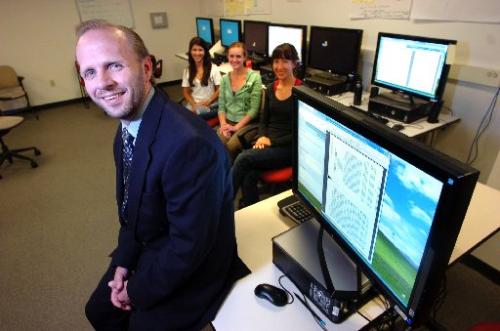Boulder Daily Camera: June 14, 2010

University of Colorado professor Kai Larsen, director of the Human Behavior Project, is one of three head researchers who will use a $350,000 grant to study the integration of behavioral sciences. Behind Larsen are his assistants - from left, Dora Georgescu, Lauren Durkee and Leslie Grush - in the Koelbel Building on the CU campus Monday. (photo by Paul Aiken, article by Whitney Bryen)
The University of Colorado's Leeds School of Business received a $350,000 grant, the school's largest grant for basic research in 20 years, toward the integration of behavioral sciences.
The Science of Science and Innovation Policy - or SciSIP - awarded the federal grant to Leeds associate professors Kai Larsen and Jintae Lee, and Eliot Rich, an assistant professor at the University at Albany, for their work with the interaction of research methodologies across disciplines.
Like the different languages spoken from one country to another, Larsen and his team are breaking down the various languages used by academic disciplines and connecting them through a pseudo-search engine.
"If you were to use Google Scholar and search 'truth' you would get over 1.5 million articles, some of which are not relevant to your intentions" Larsen said. "Our system focuses that search on high-quality research from multiple disciplines that is related to human behavior."
After recent budget cuts forced Leeds and law school researchers at CU to take on more fiscal responsibility, Larsen said his team is relieved to have a grant of this magnitude at just the right time.
"We are trying to pull our own weight and bring in funding to help transform what we do here in the business school," Larsen said. "We don't get the kind of attention that engineering research does so this really means a lot to our college, as well as us personally."
The grant has already allowed expansion of the project thanks to a loan given to the researchers by the university once the grant was announced. Besides the three head researchers, there are currently about 20 student research assistants working on the project and approximately five to 10 more are expected to be hired in the near future.
Psychology senior Heather Witte has been working on the project for more than a year and said she doesn't plan on leaving anytime soon, thanks to the grant.
"My goal is to go into research after grad school, so this is a step in the right direction," Witte said. "Hopefully I can stay on the team during grad school and expand on my work with the project."
The grant will also provide the team with the funding to hire more programmers, mostly computer science students, to improve the software and build a Web site to test its functionality.
"The money is essential to our project but it is even more exciting when someone reviews your research and they not only like what you're doing but are willing to put some money behind it," Larsen said.
Larsen began working on the project nearly five years ago thanks to a much smaller - but equally significant grant - of $25,000. After years of scrapping for grants to keep the project running, Larsen said the latest grant will provide sustenance for his team for at least three more years.
Thanks to the recent financial and personal support behind the project, Larsen said he believes the technology could be a "gold mine" for researchers of various disciplines to study human behavior.
This kind of research could improve across all areas by connecting academic disciplines like marketing, psychology, sociology, communication, science and innovation policy, nursing and education, Witte said.
"In time, it could potentially increase the quality and amount of research being done through every department and could trickle down and ultimately benefit the general population," Witte said.